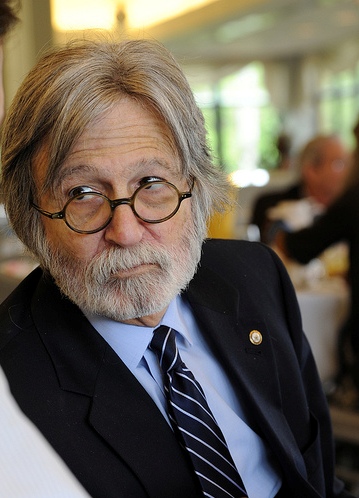Note how the light in the painting is coming from a strong source on the left, beyond the edge of the painting. It falls across part of his neck, his cheek and his untidy hair, reflecting upon his nose, and brushes along his lips and the tip of his chin. A heavy shadow falls across the rest of his face. This sharp contrast between light and dark is what chiaroscuro is all about: using shadow and darkness to imply substance and light.
This selfsame definition -- employing shadow and darkness to imply substance and light -- can also be used to describe or characterize the political art of Mitt Romney. For like Rembrandt, Romney casts his subject matter in shadow -- if not utter darkness -- in the hopes that substance will be perceived. But where Rembrandt's goal is for the connoisseur to believe he clearly sees and understands that which was never truly there, Romney's is to have the citizen believe he hears and understands that which was never truly said.
Romney's rhetorical chiaroscuro consists of misdirection, half-truths and the occasional outright lie. As an example, Romney has consistently told audiences that Barack Obama has apologized for America. In his book conveniently entitled "No Apologies," Romney writes:
"Never before in American history has its president gone before so many foreign audiences to apologize for so many American misdeeds, both real and imagined. It is his way of signaling to foreign countries and foreign leaders that their dislike for America is something he understands and that is, at least in part, understandable."
This is political chiaroscuro, plain and simple; Romney wants us to believe we actually heard President Obama "apologize for America." We didn't, because he didn't. And yet, despite the good folks at Politifact.com rating Romney's assertion a bald-faced "Pants on Fire" lie, he continues making that assertion. And to a certain extent it has worked; many people have told me they actually remember hearing the president apologize for America even while "bowing down to the King of Saudi Arabia" -- which he did not in fact do. Along the same foreign policy lines, Governor Romney has also asserted time and again that "When I become president, I will let Iran know that the United States means business ." This bit of rhetorical, political chiaroscuro is, of course, meant to state -- without actually stating -- that so long as Barack Obama remains in office, Iran has the upper hand; that the president is too weak-willed to do anything but impose economic sanctions. "And what," we may well ask, "would you do differently Mr. Romney?" "Just elect me and you'll see," comes the reply.
Most frequently, the positions on Romney's palette more shadow than substance. With regards to jobs, "I am a businessman, and thus know needs to be done." With regards to deficits, "I am a businessman, and thus know what needs to be done." In sum, he rarely commits himself on any issue save taxes (lower), regulations (fewer) or social welfare programs (eliminate). For the most part, he criticizes President Obama for his handling of everything from Appropriations to Zimbabwe, thus suggesting that he will do precisely the opposite. Again, this is employing shadow and darkness to suggest substance and light.
Recently, Governor Romney, in perhaps his most egregious use of political chiaroscuro, told a group of religious conservatives in Quakerstown, Pennsylvania that he would do "the opposite" of what President Obama has done on Israel. The words are pure shadow; they do not commit him to a single positive action regarding Israel, the Palestinians or the Middle East. The substance is implied; President Obama has thrown the Jewish State under the bus.
Let us for the moment, take Governor Romney at his word -- that he would do the precisely the opposite of what President Obama has done vis---vis Israel. What is the real implication, based not on Romney's rhetorical chiaroscuro but Obama's rreal ecord? As president:
- Barack Obama increased Israel's Qualitative Military Edge (QME), more than doubling the value of emergency military equipment that America stockpiles on Israeli soil. If we are to take Romney at his word, would he then decrease Israel's QME?
- President Obama personally intervened to save the lives of Israeli diplomats in Egypt, to which Israeli PM Netanyahu said "We owe him a special debt of gratitude. If we are to take Romney at his word, would he have let the Israeli diplomats fend for themselves?
- President Obama provided Israel with hundreds of millions of dollars in supplemental funding for missile defense programs like the Iron Dome, David's Sling and Arrows systems. If we are to take Romney at his word, would he have said "no additional funding . . . no missile shield?"
- Speaking before the United Nations General Assembly, President Obama said the Palestinians should ditch their plans to petition the international body for statehood. If we are to take Romney at his word, would he then support unilateral Palestinian statehood"
- President Obama spearheaded international efforts to impose what Iranian President Ahmadinejad termed "the most extensive and dastardly sanctions ever . . . the heaviest economic onslaught on a nation in history." As a result, Iran cannot access 70% of its foreign currency reserves, $60 billion worth of foreign contracts have been cancelled or suspended and companies like Shell, Total, ENI, Toyota, Siemens and Lukoil have all pulled out of Iran. If we are to take Romney at his word, may we presume that he would have permitted Iran to continue making a fortune pumping and shipping oil?
Chiaruscuro can be both breathtaking and brilliant. When used as an artistic technique by a master like Rembrandt van Rijn, it lends brilliance, elucidation and light to that which is most tenebrious. When used as a political strategy by a manipulator like Mitt Romney, it can do little more than plunge adumbral shadows into inky darkness.
-2012 Kurt F. Stone






